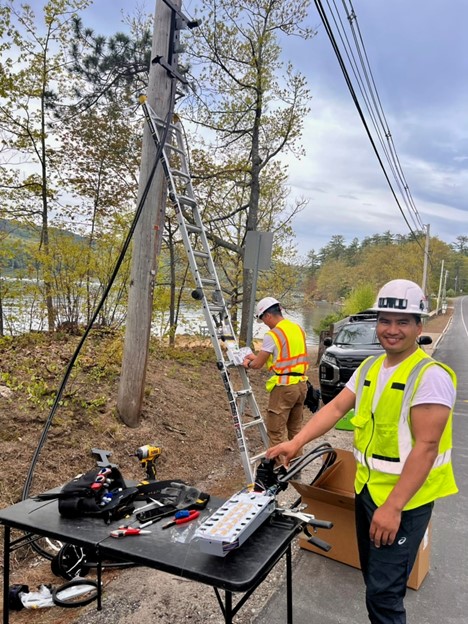By RICHARD KNOX
The NH Electric Co-op election, which began on Tuesday and will continue until June 12, sparks a crucial public debate for approximately one in 10 New Hampshire residents who rely on this nonprofit utility for their power.
The crux is simply this: Who’s looking out for electricity-buyers’ best interests?
Keep in mind that utility companies are state-sanctioned monopolies. They have a license to take money out of customers’ bank accounts. Once they set electricity rates, customers have no recourse but to pay.
Most power companies are investor-owned. The state Public Utilities Commission (PUC) approves their rates. The Co-op stands out. It operates under a unique self-regulated model, where those who pay the bills own the company. They elect a board of directors who are duty-bound to act on their behalf.
The 2024 election is a pitched battle between board members who say they can’t get the information they need to fulfill this fiduciary duty and the current board majority, which maintains directors get all the information they reasonably require from the Co-op’s (unelected) management.
“Directors already have complete access to all information needed to set NHEC’s electric rates,” the current board chair, Sharon Davis, wrote last week in a letter to the Laconia Daily Sun. “The information is summarized and presented in public session at our monthly board meetings.”
End of story? No. The key words in Chair Davis’s statement are “all the information needed” and “summarized.” The not-so-obvious meaning is “all the information management decides the board needs” and “summarized by management.”
When directors in the minority insist on receiving documents, they can be required to go to NHEC’s Plymouth headquarters, where they may have view-only access (no copying). Hundreds or thousands of pages may be viewed but not downloaded or searched. Under those conditions, meaningful analysis is impossible.
Why should members care about this internal freedom-of-information struggle? Here’s an example:
One type of document that can be viewed by directors only at NHEC headquarters are energy contracts that determine the cost of power members are charged. That cost, termed “Co-op Power” on monthly bills, can be 40 to 60 percent of the total due.
The PUC reviews the energy charge of other electric utilities. In the Commission’s practice, documents related to the energy charge are viewable and downloadable by anyone including the general public. A few documents, such as competitive bid prices, are partially redacted in public postings, but unredacted documents are available to Commissioners and PUC staff.
Recently this power charge became a matter of concern when the NHEC’s jumped from the state’s lowest to its second-highest. Some directors wondered why.
To investigate it, the NHEC required directors to travel to Plymouth headquarters for view-only access to energy contracts. Imagine if Eversource required PUC commissioners to trek to its Boston headquarters to pore through data needed to evaluate a proposed rate hike. No one would stand for that.
Such restrictions, which occur on a case-by-case basis, explain why 450 members petitioned the Co-op to put the proposed bylaw change on this year’s NHEC ballot. It aims to amend the Co-op’s bylaws to require that documents must be provided if three or more board members request them. The proposal allows certain kinds of confidential information to be protected, and all directors have a clear duty not to disclose confidential information they may gain access to.
NHEC officials opposed to the bylaws amendment have used their control over the company’s communications, and the very design of the ballot, to suppress member awareness of its nature. Unlike prior elections, NHEC communications to members do not mention the subject of the bylaw amendment, which can be summarized very simply as “directors’ access to information.”
More importantly, the 2024 ballot breaks precedent by not summarizing the bylaws amendment before members are asked to vote on the issue. Instead, members are advised in bold, underlined text to vote against the amendment, followed by NO/YES boxes to check, without being told what it’s about.
On the electronic ballot, members learn the subject matter of the amendment only after they click on a link to a small-font, difficult-to-read PDF document.
Of the nine candidates running for the board this year, only three support the access-to-information proposal – incumbents Leo Dwyer and Jeff Morrill and a newcomer, state Rep. Jerry Stringham. The others, who all have the endorsement of the board-appointed nominating committee, have remained silent.
This is a time when NHEC, like all electric utilities, faces big challenges in transitioning from traditional power sources to renewable energy, promoting energy storage, and furthering the interests of members with solar arrays without burdening others.
NHEC is also hip-deep in its new broadband venture. It’s entering a highly competitive marketplace very different from the monopoly-protected electricity business. Careful board oversight is critical.
This is no time for informational obstructions.
Richard Knox lives in Sandwich. He chairs NH Broadband Advocates, a group that successfully lobbied in 2020 to get NHEC into the business of providing broadband to its members.
Editor’s note: InDepthNH.org takes no position on columns and op-eds, but welcomes diverse opinions by emailing nancywestnews@gmail.com






